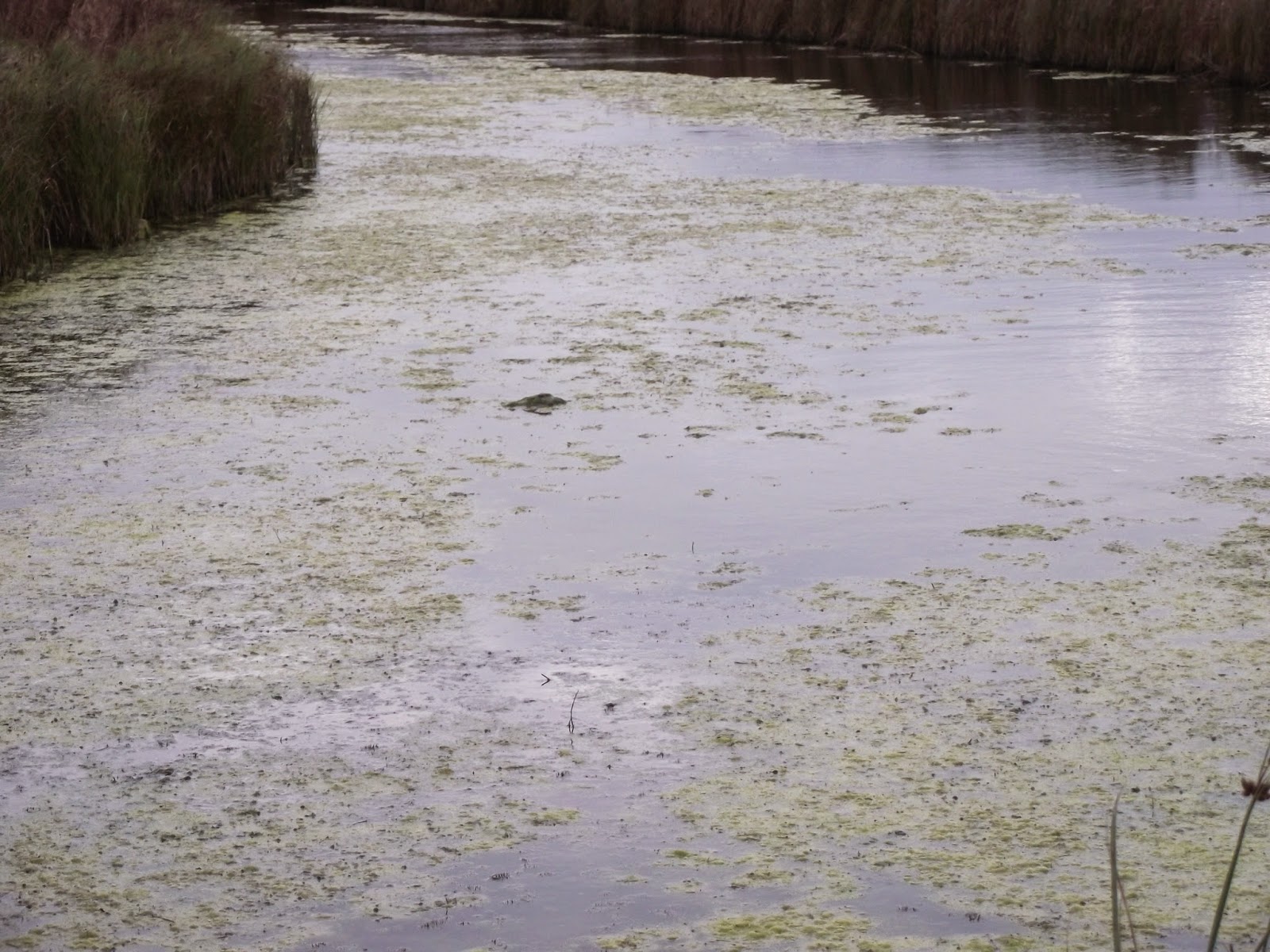Whilst I'm always loathe to see the end of guaranteed warm weather, even early mornings this last week or so have been very uncomfortable in very humid and murky conditions and being accompanied by a continuous cloud of hungry mosquitoes all the way round has been intolerable, there was none of that this morning.
Climbing on top of the sea wall I immediately noticed that the wind was bringing with it the awful stench of the reserve's stagnant ditches and fleets. Virtually no rain for several weeks has seen both the water and oxygen levels in them to drop away quite dramatically and what water that is left in them is either a puce or blue-grey colour. As you can see below, the weed is starting to decompose on the surface and sulphurous bubbles regularly come to the surface.
It typifies how the reserve is at the moment, it's very dry and pretty much devoid of bird life, one reason I imagine, that even the wildfowlers have been absent this last week, the Greylags have moved somewhere else and ducks are counted in ones or twos. So many autumns have been like this on the reserve in recent years that it's pretty much become the norm but it makes for some pretty uninspiring walks round, feeling great if you total more than ten of any particular species. Mind you I recall asking for lots of rain this time last year and it really came back to bite me as we had the wettest winter for a hundred years, it's always the same in North Kent, either too dry or too wet.
Early morning on Wednesday saw the first visit this autumn by one of the local hunts and they spent most of the morning working their way round the farmland of Harty looking for foxes. I believe at this time of the year it's called "cubbing", where the young hounds learn from the older ones how to go about fox hunting. Yes, I know that hunting with dogs is banned but that has never bothered the hunts that visit Harty a few times each year and you can hear them actively encouraging the hounds to work through the thickets and reed beds. They are also accompanied by a terrier man on a quad bike, who presumably has the terriers available should any foxes go to ground and need digging out.
Now I'm not going to turn hypocritical and say that I don't agree with killing foxes, because both the NNR's on Sheppey, control foxes throughout the year and I accept that it is a necessary fact of successful reserve management. My only real problem with the hunts is their attitude towards land that they don't have permission to be on, they quite often charge across that without a thought and even get stroppy when challenged. They also, as they did on Wednesday, regularly work the hounds through the whole length of the Capel Fleet reed beds, which have SSSI, SPA and Ramsar status and protection, in order to flush out any foxes, disturbing everything else in the process.
On a far happier note, the Kent Field Club have just published Vol.18 of their regular booklets about various aspects of Kentish flora and Fauna and it is entitled "The Natural History of the Isle of Sheppey". For anybody interested in Sheppey's geology, animals, birds, moths, butterflies, insects, flowers, ditch systems, etc. etc, it is a 270 page booklet packed with colour photographs, maps and numerous chapters written by very knowledgeable people.
It can be bought for £12 + £2 pp by sending a cheque made out to Kent Field Club to Ms. K. Friend, 2, West End Cottages, The Street, Doddington, Kent. ME9 0BZ
Early morning on Wednesday saw the first visit this autumn by one of the local hunts and they spent most of the morning working their way round the farmland of Harty looking for foxes. I believe at this time of the year it's called "cubbing", where the young hounds learn from the older ones how to go about fox hunting. Yes, I know that hunting with dogs is banned but that has never bothered the hunts that visit Harty a few times each year and you can hear them actively encouraging the hounds to work through the thickets and reed beds. They are also accompanied by a terrier man on a quad bike, who presumably has the terriers available should any foxes go to ground and need digging out.
Now I'm not going to turn hypocritical and say that I don't agree with killing foxes, because both the NNR's on Sheppey, control foxes throughout the year and I accept that it is a necessary fact of successful reserve management. My only real problem with the hunts is their attitude towards land that they don't have permission to be on, they quite often charge across that without a thought and even get stroppy when challenged. They also, as they did on Wednesday, regularly work the hounds through the whole length of the Capel Fleet reed beds, which have SSSI, SPA and Ramsar status and protection, in order to flush out any foxes, disturbing everything else in the process.
On a far happier note, the Kent Field Club have just published Vol.18 of their regular booklets about various aspects of Kentish flora and Fauna and it is entitled "The Natural History of the Isle of Sheppey". For anybody interested in Sheppey's geology, animals, birds, moths, butterflies, insects, flowers, ditch systems, etc. etc, it is a 270 page booklet packed with colour photographs, maps and numerous chapters written by very knowledgeable people.
It can be bought for £12 + £2 pp by sending a cheque made out to Kent Field Club to Ms. K. Friend, 2, West End Cottages, The Street, Doddington, Kent. ME9 0BZ


No comments:
Post a Comment